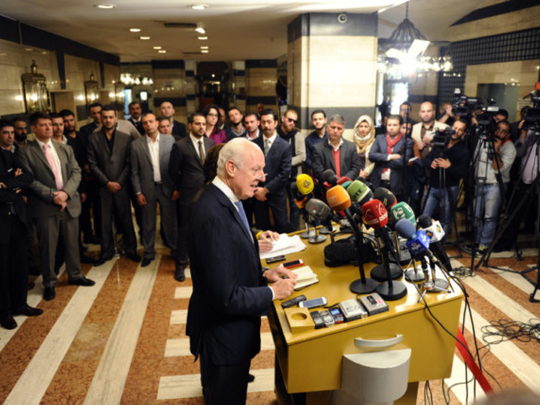
Beirut/Damascus: A common threat posed by Daesh militants to Syria’s warring factions may help push government and rebel forces toward local truces, the United Nations’ peace envoy to Syria said in an interview published on Tuesday.
In a news conference in Damascus on Tuesday, UN envoy Staffan de Mistura again called for a freeze in fighting, though activists cast doubt on the plan.
De Mistura is pushing an initiative to create “incremental freeze zones” to stop localised fighting and improve aid access, starting in the northern city of Aleppo.
Syrian President Bashar Al Assad was quoted on Monday as saying the proposal was “worth studying”.
De Mistura told the British Broadcasting Corporation (BBC) that Daesh was “destabilising everybody”.
Asked what incentive rebel and government fighters may have to accept local truces, De Mistura said: “There is one major new factor. What is that called? Daesh. ISIS. Terrorism.” The militants have seized swathes of territory in Iraq and Syria and are now the target of US-led air strikes.
“Second ... no one is actually winning (in Syria’s civil war),” De Mistura added. “You think that one side may be winning? The truth is no one is. And that’s why we have an idea about how to push at least one major example, Aleppo.” De Mistura acknowledged that, even if the UN plan went forward, it would only be an initial step in a conflict which has killed some 200,000 people and displaced millions.
“Saying having a peace plan would be ambitious and delusionary. But I do have, we do have, an action plan. And the action plan starts from the ground: stop the fighting, reduce the violence,” he said.
Previously, pro-government Syrian media lashed out at De Mistura, accusing the envoy of overstepping his bounds for suggesting local truces.
The envoy called the situation urgent.
“Aleppo is not far from a possible collapse,” he said. A truce would be a “building block for a political process.”
Aleppo is the last major city where rebels hold large areas, but they are under attack from advancing regime forces. Daesh group is trying to take nearby rebel-held communities and activists fear they will try advance on Aleppo.
Parts of rebel-held areas pulverised and abandoned after thousands were killed in government bombings, and rebels are divided into squabbling factions.
Many activists said the envoy’s efforts may be too late because of the damage done in three years of war. But Mohammad Al Shafi, an activist from Aleppo, said if the government agreed to a truce, residents would pressure rebels to follow suit.
“People in Aleppo are tired, everybody runs all day just to find bread. They only have food aid, donated baskets,” he said.
Aleppo’s rebels have so far not issued a unified statement on the UN envoy’s proposal. Only Tuesday did 14 rebel groups there announce a joint operations command, the Britain-based Syrian Observatory for Human Rights reported.
Activist Ahmad Hamed also hoped a truce would be “the beginning of the end” of the conflict, though he said he feared it could allow government forces to regroup and tempt Daesh fighters to barrel into Aleppo.
“Of course, the Daesh won’t agree to a truce,” Hamed said.











